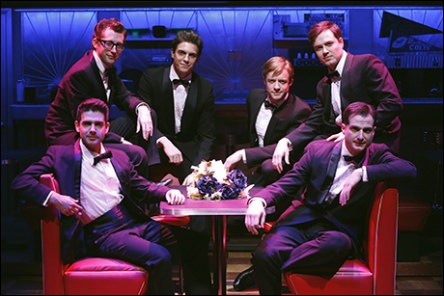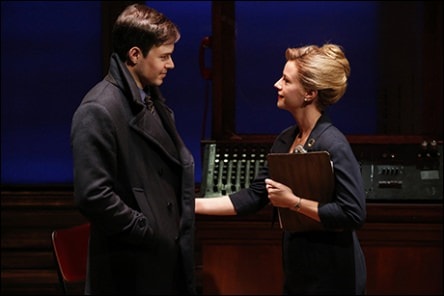Music easily helps us drift back to another time and place, one that is fading away even as we try to keep it alive within us. It takes only the initial notes and musical measures of oldies but goodies to bring us back willingly into the past. Some blissfully glide into the fortunate reverie of an untroubled time; others float back into the happy turbulence of glory days as when they tried to find their way into some semblance of adulthood.

For those wanting a musical to recall the heavenly days of doo-wop harmony groups choreographed girl groups, and the wonder years of early rock-and-roll, head off to Signature Theatre for the highly anticipated new musical, Diner.
The musical is based upon the much loved 1982 motion picture Diner written and directed by Baltimore native Barry Levinson. The Academy Award-winning Levinson also wrote the book for this musical Diner with music and lyrics written by nine-time Grammy Award recipient Sheryl Crow. Diner is directed and choreographed by Kathleen Marshall, a three-time Tony Award®-winning director and choreographer.
The set-up is this: It’s 1959. It’s the Christmas /New Year’s period. We are in Baltimore. Six long time buddies, who are now in their 20’s, have clearly not quite “grown-up.” They are meeting late at night, as they have for years, in their local diner. Women are not invited, thank you very much. This is a world before Betty Friedan and “The Feminine Mystique”.
What brings the guys together is the imminent marriage of one of them. Well, marriage if his fiancée is able to answer a special test about the world football champion Baltimore Colts of the Johnny Unitas and Alan Ameche days. For these guys, the times outside may be a changin’, but they don’t have much of a clue. As they talk and talk over coffee and hassle each other about a ride home, a roast beef sandwich or movies, there are whiffs of something missing in their lives including knowledge about women.
Levinson’s book for Diner uses a number of comic vignettes that brought plenty of laughter to those at Signature. You may never think of a movie popcorn box the same way ever again. You may wish you were there when the Baltimore Block was a heavenly place for sailors on liberty and married men ‘working late.’ You might even giggle to yourself about a time in an outside Church manger scene as a doo-wop singing, drunken “Wise Man.”
Levinson’s book and Crow’s score also make the musical more than just about the lives of six “guys.” Over the course of the production, the women characters come across as the smarter, deeper, more nuanced, lovable ones. There is also a narrator in the guise of a character with gravitas known as “Older Boogie” (John Schiappa)who guides the production along from a “looking back” perspective.
In addition at the end of the production, “Older Boogie” provides a coda giving the audience a quick glance into the 21st century lives lived of Diner’s 1959 characters. It is not unlike what some may recall from the movie American Graffiti. But the Diner coda floats quickly over the decades without a mention of the turbulent times of the Vietnam War, Civil Rights Movement, Women’s Rights and lots of other material historical issues. It is as if it was tacked on as an afterthought. Its purpose is clear, let the audience know what happened to the characters, but to me misses the mark. It was done in a blink!
One major note, the vignette scenes too often felt parachuted in or as if somehow they were truncated or disconnected; more meant for those well familiar with the 1982 movie, not so much for those with scanter knowledge of the original movie. One particular scene about the importance of a vinyl LP record collection kept in a particular order and the flip side of a 45 record fell emotionally flat – not so much heart-breaking.
Crow’s score succeeds in being a wonderful mimicry of the later 1950’s teen/young adult tastes. The song titles and lyrics by Crow are worthy of a sly grin, off-center smile and knowing bright eyes. The up-tempo songs bring foot-tapping perkiness to the show. The ballads sell us on the pain of trying to find love. It was as if Buddy Holly was in the House along with so many others of those times and place.
The audience may even think they hear a few bars from a familiar song from the actual period. This is not the case. Crow’s nearly 20 song score is all new. The music is played with great gusto by a six piece band under the music direction and additional arrangements by Lon Hoyt, with orchestrations by Mitchell Froom.
The singing voices of the cast members in solos, duets or groups numbers are a delight. Harmonies from what is known as the “Doo-Wop Guys” adds to the overall atmosphere of the show. Kathleen Marshall’s choreography keeps things visually appealing. Her characters never just sit; they slouch, they fidget, and the males plop themselves anywhere and everywhere. Her actors bring charm to what could be static scene such as one with three women under hair dryers who in unison move their shoulders, knees and legs while tilting magazines.
The six long time buddies in the cast include Bryan Fenkart, Aaron C. Finley, Josh Grisetti, Adam Kantor, Derek Klena, and Matthew James Thomas. Each gives their character likability. Given the way their characters are written, that is not always an easy acting task. The female leads include Whitney Bashor, Erika Henningsen, and Tess Soltau. Each is adroit at providing complexity and real life nuance to their characters. Signature and crowd favorite Nova Y. Payton adds plenty of sass in her musical numbers and an eyes-open amusing strut.

Scenic design by Derek McLane with James Kronzer’s scenery adaptation give an audience plenty to view including the well-done innards of a diner. Costumes are by Paul Tazewell and wigs are by Charles G. LaPointe provide ample character differentiation throughout the production. Thankfully, no poodle skirts.
Diner‘feels’ a work still in some progress as it continues its journey as a full production before audiences. For those of a certain generation or for those who know the original Diner movie, there is much delight. It is a visit with old friends, learning what may have happened since last seen. The score is not merely a song-track of well-known juke box songs, but all new tunes. The score accompanies the travails of fictional young adults with rarely a good clue as to what is over the horizon. The music gives the audience plenty to smile about; or maybe dream about their own life lived.
Running Time: 2 hours and 30 minutes, with one intermission.
Diner plays through January 25, 2014 at Signature Theatre – 4200 Campbell Avenue, in Arlington, Virginia. For tickets, call the Box Office at (703) 820-9771, or purchase them online.
LINK
In his column ‘Spine,’ Robert Michael Oliver reviews ‘Diner’ at Signature Theatre.




